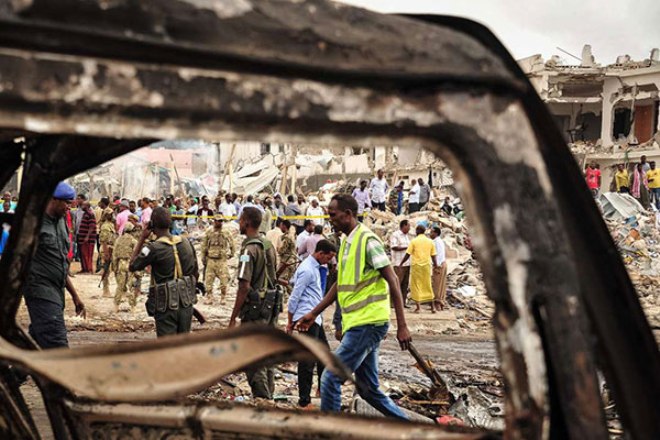
Sunday October 22, 2017

It's been a week since a massive truck bomb blew up in the center of Mogadishu. It killed more than 350 people in what Somalis are describing as their 9/11. NPR's East Africa correspondent Eyder Peralta has been following this story and joins us now from Mombasa in Kenya.
Eyder, obviously September 11, 2001, changed the United States in a huge way. Is what happened in Somalia truly comparable though?
EYDER PERALTA, BYLINE: I mean, this is the single deadliest attack in the history of Somalia. The government says 358 people are confirmed dead, but another 56 are still missing, so that number is probably going to cross the 400 mark. So just in terms of sheer numbers, the attack has really affected a whole lot of people in the capital. Yesterday, I spoke to Abdi Aynte. He served for a couple of years as a Cabinet minister. And what he says is that this is so big that it calls into question the, quote, "viability of our governance system." But he says the thing that hurts him the most is the disappointment.
Mogadishu has been on a rebound in the last few years. And the government had really secured the place. And there was new investment, which he thinks that will be spooked. But he says the one good thing to come out of this is that the attack has given Somalis the license to speak out against extremism.
SINGH: Have you seen Somalis protest in the streets in large numbers?
PERALTA: They have. You know, we've seen thousands of people in Mogadishu wearing red bandanas, calling for an end to the bloodshed. I'm in Mombasa right now. And it's just down the coast from Mogadishu, so there's a big Somali diaspora here. I took a walk through the Somali market, and what I heard was a community that is soul searching. I spoke to Uda Abdi Mahamud, and she says it is time for Somalis to start facing some hard truths. Here's what she told me. You'll hear her followed by an interpreter.
UDA ABDI MAHAMUD: (Through interpreter) Each and every government that's formed in Somalia, Somalis have the tendency of blaming the West, but that's a lie. The government that has been formed which we had hope with his being interfered by nothing other than the local Somalis who are living in Somalia.
PERALTA: So the essence of what she's saying is that al-Shabab is a Somali problem that needs to be dealt with by Somalis.
SINGH: Al-Shabab has been widely suspected of being behind this terrible attack. Has there been any more clarity on that?
PERALTA: No, not really, not officially. I mean, the - al-Shabab hasn't taken responsibility. But I've been talking to a lot of people, and they say the same thing, that yes, it is possible that someone else did this. But it's hard to imagine that any other group has the drive or much less the technical know-how to do something like this. The government has blamed al-Shabab.
An army spokesman told the Associated Press that President Formajo will declare a state of war, and that's supposed to kick off an offensive to flush out al-Shabab from its strongholds. Basically, they're trying to deny the Islamist group a place to plan attacks like this. It's also likely that Somalia will seek deeper involvement from the U.S. and that's something to watch stateside.
SINGH: That's NPR's East Africa correspondent Eyder Peralta joining us from Mombasa in Kenya. Eyder, thank you.
PERALTA: Thank you, Lakshmi.